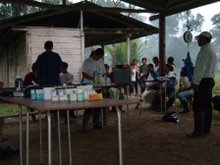Our intro class on emerging trends in global health reminded me of an interesting model for sustainable development I saw in the Ecuadorian rainforest in 2006. While I went there to learn about the practice of rural medicine, I was exposed to a promising business model that exploited the tourist industry to bring healthcare, education and buying power to a small region along the Napo River called Mondana.
Like Dr. Shahi said, 90% of healthcare is not accomplished by physicians. What was impressive about Mondana's set-up was not the high level of medical care available to the community. In fact, the clinic lacks any special equipment and must often refer patients to the nearest city, Tena. Many patients are unable to afford the cost of transportation (about $7 U.S.). What was impressive is the establishment of a boarding school that teaches rural children basic education as well as skills in making jewelry, giving tours of the rainforest, and running a hotel. These children get hands-on experience working at the Yachana Lodge as housekeepers, tour guides and boatmen. Proceeds of Yachana go to fund the school and keep the clinic running. The school is now an accredited establishment, and children are receiving grants to study in the capital city of Quito. A few of these kids will go on to acquire professional skills which they can use to improve the status of Mondana and nearby communities.
Along with Yachana, a gourmet chocolate company was established to supplement the lodge's income. Using slow-roasted cacao beans and other ingredients found in the rainforest, locals have created a unique chocolate product that I was very surprised to find in drugstores in Quito, and in fine health food stores here in the U.S. Like Yachana Lodge, the chocolate caters to the palate of developed countries, and that's how a rural rainforest community has (hopefully) begun its way up the ladder of sustainable development.
Subscribe to:
Post Comments (Atom)





4 comments:
This is an amazing story, and critical to developing a new way of helping those in need. It seems that whenever "we," meaning altruistic minded people in the west, think about "them," the people of the third world, we think of how sad and horrible their lives are and how we need to help them change it. Instead we need to stop underestimating them and using these billions of dollars in aid to help them create their own sustainable solutions like the one you mention here. Also if we approach health as Mohammad Yunus approached the economic aspects of poor people's lives we'd be much more succesfull.
http://nobelprize.org/nobel_prizes/
peace/laureates/2006/
yunus-interview.html
It was interesting to know about the mondana setup.
Nice thoughts farah!!!!!
What a beautifully told story, Farah...I am so proud that you have had the chance to travel and visit such amazing, life-enriching places. These experiences will surely help you on your way to becoming a physician! I am proud to know you.
Farah your site looks very good! I didn't know where to start to read your website and blog. I read in your blog that you mentined:
"Dr. Shahi said, 90% of healthcare is not accomplished by physicians"
So according what your passion is, I think this is a a great fit for you with your personality! May be public health is a field that you are made for...
Good Luck sweetie
Post a Comment